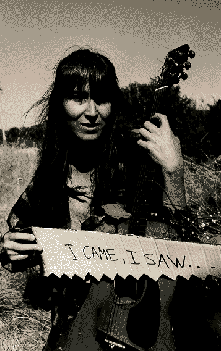

In 1992, after six months of concerted effort to transform People's Park from free space to a UC and city controlled sports facility, the University of California tried a new tactic; a SLAPP-suit. SLAPP is an acronym for Strategic Lawsuit Against Public Participation.Carol Denney was sued for more than a quarter of a million dollars as a "key leader" of the resistance along with David Nadel, Bob Sparks, Mike Lee, and 50 "Does", or unknown people in danger of being included in the suit through the process of legal discovery.
The University was forced to drop its damage claims but was awarded an injunction against the defendants which still stands today and threatens anyone who speaks against the University of California. All of Denney's named co-defendants are now either deceased or out of state and can hardly pose a threat to the University of California, the sixth largest nuclear weapons contractor in the world, which has spent half a million dollars suing Denney.
Here is a current editorial on the SLAPP-suit:
Drop the SLAPP-Suit; The Real News About People's Park, by Carol Denney 3-31-08 Denney was accused, among other things, of creating dozens of cardboard saws inscribed with the legend, "I came, I saw...", a stage prop used during a concert and demonstration in the summer of 1991.If you ask people what's happening in People's Park lately, they might tell you about the mass resignation of the pave-the-park faction of the advisory board, or the uppity consultant group that refused to submit a clear, permanent redesign proposal, or the refusal of the university to support a public design contest for a newly configured park.
The probability of anyone mentioning the SLAPP-suit would be low.
Only a few people remember that the University of California attached a $100,000 price tag to the free speech of a few People's Park advocates in 1992, hoping to silence the entire community. The silence about the SLAPP-suit sixteen years later is strong evidence that Strategic Lawsuits Against Public Participation are very effective.
Imagine waking up to a voice machine message from a UC lawyer letting you know you were expected in Superior Court the following day to answer charges that you were the nexus of a violent conspiracy with people whose names you'd never heard before.
Imagine scrambling down to the courtroom to find out you'd been accused of creating cardboard stage props and carrying roses, and that the sixth largest nuclear weapons manufacturer in the world was arguing that you therefore constituted a public danger, for which they needed a temporary restraining order, followed by a permanent injunction.
Imagine that the injunction including digging in People's Park, an activity you had enjoyed since the park's creation as a part of years of working in the community garden.
It should be obvious that none of the 50 Jane and John Does included in the still current injunction could possibly feel free to attend public meetings and express opinions about the park, since those very activities were the charges against them in the SLAPP-suit. Those who still do are risking another $100,000 gauntlet through Superior Court, another five years of their lives.
People's Park may need a few repairs, some weeding, and better drainage during the rains. But the most important repair is the one they won't let anyone discuss; dropping the SLAPP-suit so that all of us can share equally in any discussion about the park's future.
Denney continues in her effort to vacate the injunction stifling free speech in People's Park. Any donations to the SLAPP-suit defense are greatly appreciated.
For more information contact Carol Denney at cdenney@igc.org.